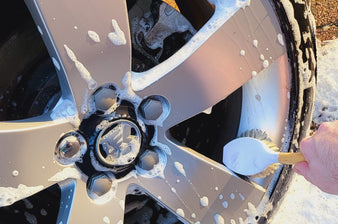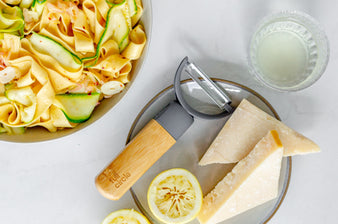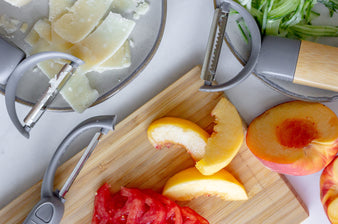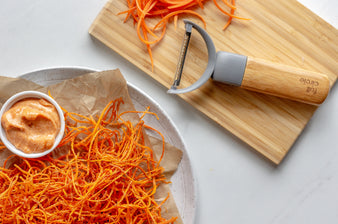Zero Waste Materials
There are a few things that go into making a zero-waste product. We have to choose appropriate materials and consider what happens when the product can’t be used any more. Above all, we can’t sacrifice on quality or functionality!
Let’s take a deeper look at these three aspects of our new zero-waste collection.
Appropriate Materials
Plastic is one main material that is typically not suitable for a zero-waste product (although, with our use of recycled plastic, we’re trying to change that, too!). Because plastic is the main material in most of the products we know and love, our avoidance of it required us to get a little creative about the materials we did end up sourcing. So, we traveled around the globe (virtually, of course) to look for natural materials that can stand up to your household dirt and grime—without damaging our planet.
Here are a few sustainable stand-out materials that you might see next to your kitchen sink soon:
- Coconut Husk: If you like pina coladas as much as clean surfaces, you’ll appreciate that our scour pads get their scouring power from coconut husk. The fiber is found inside the husk of an unripe coconut. Once removed, the stringy fibers are perfect for several different uses—scrubbing caked-on stains being one of them.
- Natural Latex: Who would have thought balloons and gloves came from a tropical tree?! Even better, latex is sourced from the tree in a process similar to tapping maple syrup—meaning that the tree isn’t harmed and continues to live. In our case, latex’s stickier side is used to keep the coconut fibers together in our scour pads. Two materials to transport you to the tropics while you scrub away stains.
- Organic Cotton: Cotton is one of the world’s thirstiest crops—for both pesticides and water. Organic cotton, on the other hand, requires a lot less and supports the environment—all while retaining all of cotton’s clean-worthy properties (read: softness, durability, breathability, and absorbency).
- Jute: Jute fiber is super tough, but will break down quickly in your compost bin. When it comes to strong reinforcements, this natural material takes the cake (and will help you clean carrots to make one).
- Natural Cellulose: Cellulose is a science class word for “fiber” and it’s found in all plants. We get ours from one of the most beautiful renewable resources on our planet (here’s looking at you, trees!). We love it because it’s plant-based, natural, and tough—yet gentle enough to break down naturally.
- Hemp: Hemp is the main material in Japanese washi paper, an artistic-turned-abrasive product that we’ve paired with organic cotton to create a compostable and washable scrubby cloth.
End-of-Life Impact
Let’s (Full) Circle back to coconut husk. Was it chosen because of its scrub-suitable texture? Sure. But it was also chosen for one of its other uses. Any green thumb is probably familiar with coconut coir—which is another word for coconut husk (or fiber)—because it’s great in the garden! It helps to retain moisture and provide good aeration for plants. So, once you can scrub no more, toss that scour pad in the compost or garden and let it work even more of its magic. See how we have our planet, your kitchen, and your garden in mind? This is because we think it’s important to think long-term, especially about how a product will impact our environment once it’s discarded.
Like coconut husk, all of the other materials used for our zero-waste collection can be composted. As natural plants themselves, they’ll go back into the earth to support it—instead of ending up releasing dangerous microplastics in a landfill.
Quality and Functionality
Surely there has to be a catch, right?
Not in this case.
These sustainable superheroes work just as well as their conventional counterparts to scrub, clean, and wipe. As water and wear might speed up their biodegradability slightly, you may just start to notice that they show clear signs that they’re ready for a replacement—which, if you think about how long you’ve been using that stinky dish sponge, might actually be a good thing.
As you can see, we leave no stone unturned when it comes to being kind to our planet. We ask that you leave no surface uncleaned, and join us in using products that are completely zero-waste.




